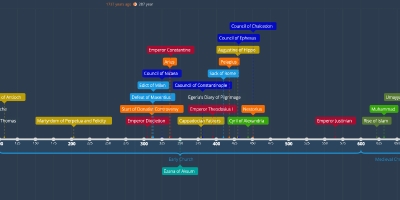jan 1, 325 - Council of Nicaea
Description:
In CE 325, the Ecumenical Council of Nicea was called by Emperor Constantine to address the rising controversy over the theological ideas of Arius. Known as the Arian controversy, the chief claim of Arius that aroused protestation was that the Son of God, Jesus Christ, was not of equal divinity with the Father. According to Arius, the begetting of the Son by the Father means that the Son is created and therefore a creature, though a divine creature. Alexander of Alexandria had previously condemned Arius as heretical in 318, but it was not until the Council of Nicea that he and Athanasius of Alexandria presented their argument that the Father and the Son are homoousios (of the same substance) and that the Son is eternally begotten by the Father. The Nicene Creed reads as follows:We believe in one God, the Father Almighty, maker of all things visible and invisible; and in one Lord Jesus Christ, the Son of God, the only-begotten of his Father, of the substance of the Father, God of God, Light of Light, very God of very God, begotten, not made, being of one substance with the Father. By whom all things were made, both which be in heaven and in earth. Who for us men and for our salvation came down [from heaven] and was incarnate and was made man. He suffered and the third day he rose again, and ascended into heaven. And he shall come again to judge both the quick and the dead. And [we believe] in the Holy Ghost. And whosoever shall say that there was a time when the Son of God was not, or that before he was begotten he was not, or that he was made of things that were not, or that he is of a different substance or essence [from the Father] or that he is a creature, or subject to change or conversion all that so say, the Catholic and Apostolic Church anathematizes them.
Added to timeline:
Date:
jan 1, 325
Now
~ 1701 years ago
